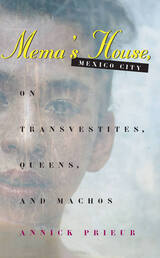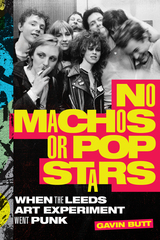2 books about Machos

Mema's House, Mexico City
On Transvestites, Queens, and Machos
Annick Prieur
University of Chicago Press, 1998
Mema's house is in the poor barrio Nezahualcoyotl, a crowded urban space on the outskirts of Mexico City where people survive with the help of family, neighbors, and friends. This house is a sanctuary for a group of young, homosexual men who meet to do what they can't do openly at home. They chat, flirt, listen to music, and smoke marijuana. Among the group are sex workers and transvestites with high heels, short skirts, heavy make-up, and voluminous hairstyles; and their partners, young, bisexual men, wearing T-shirts and worn jeans, short hair, and maybe a mustache.
Mema, an AIDS educator and the leader of this gang of homosexual men, invited Annick Prieur, a European sociologist, to meet the community and to conduct her fieldwork at his house. Prieur lived there for six months between 1988 and 1991, and she has kept in touch for more than eight years. As Prieur follows the transvestites in their daily activities—at their work as prostitutes or as hairdressers, at night having fun in the streets and in discos—on visits with their families and even in prisons, a fascinating story unfolds of love, violence, and deceit.
She analyzes the complicated relations between the effeminate homosexuals, most of them transvestites, and their partners, the masculine-looking bisexual men, ultimately asking why these particular gender constructions exist in the Mexican working classes and how they can be so widespread in a male-dominated society—the very society from which the term machismo stems. Expertly weaving empirical research with theory, Prieur presents new analytical angles on several concepts: family, class, domination, the role of the body, and the production of differences among men.
A riveting account of heroes and moral dilemmas, community gossip and intrigue, Mema's House, Mexico's City offers a rich story of a hitherto unfamiliar culture and lifestyle.
Mema, an AIDS educator and the leader of this gang of homosexual men, invited Annick Prieur, a European sociologist, to meet the community and to conduct her fieldwork at his house. Prieur lived there for six months between 1988 and 1991, and she has kept in touch for more than eight years. As Prieur follows the transvestites in their daily activities—at their work as prostitutes or as hairdressers, at night having fun in the streets and in discos—on visits with their families and even in prisons, a fascinating story unfolds of love, violence, and deceit.
She analyzes the complicated relations between the effeminate homosexuals, most of them transvestites, and their partners, the masculine-looking bisexual men, ultimately asking why these particular gender constructions exist in the Mexican working classes and how they can be so widespread in a male-dominated society—the very society from which the term machismo stems. Expertly weaving empirical research with theory, Prieur presents new analytical angles on several concepts: family, class, domination, the role of the body, and the production of differences among men.
A riveting account of heroes and moral dilemmas, community gossip and intrigue, Mema's House, Mexico's City offers a rich story of a hitherto unfamiliar culture and lifestyle.
[more]

No Machos or Pop Stars
When the Leeds Art Experiment Went Punk
Gavin Butt
Duke University Press, 2022
After punk’s arrival in 1976, many art students in the northern English city of Leeds traded their paintbrushes for guitars and synthesizers. In bands ranging from Gang of Four, Soft Cell, and Delta 5 to the Mekons, Scritti Politti, and Fad Gadget, these artists-turned-musicians challenged the limits of what was deemed possible in rock and pop music. Taking avant-garde ideas to the record-buying public, they created Situationist antirock and art punk, penned deconstructed pop ditties about Jacques Derrida, and took the aesthetics of collage and shock to dark, brooding electro-dance music. In No Machos or Pop Stars Gavin Butt tells the fascinating story of the post-punk scene in Leeds, showing how England’s state-funded education policy brought together art students from different social classes to create a fertile ground for musical experimentation. Drawing on extensive interviews with band members, their associates, and teachers, Butt details the groups who wanted to dismantle both art world and music industry hierarchies by making it possible to dance to their art. Their stories reveal the subversive influence of art school in a regional music scene of lasting international significance.
[more]
READERS
Browse our collection.
PUBLISHERS
See BiblioVault's publisher services.
STUDENT SERVICES
Files for college accessibility offices.
UChicago Accessibility Resources
home | accessibility | search | about | contact us
BiblioVault ® 2001 - 2024
The University of Chicago Press









